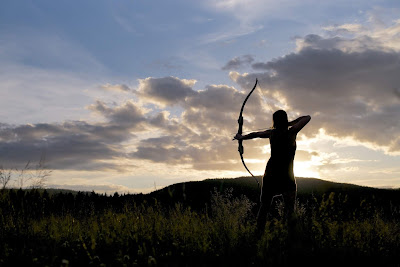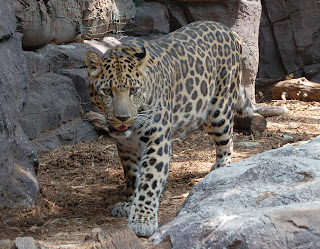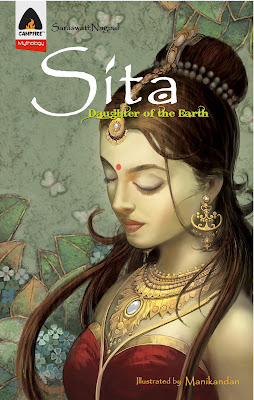Week 5 Story: "Sita, Warrior of the Earth"
A warrior of the Earth. Source: Flickr
Let me tell you the version of the story they never tell. I was not just the daughter of the Earth, I was her warrior.
At the time of my birth, my parents believed I was only a gift from the goddess. Some called her Bhudevi, others called her Bhumi, but while growing up in the kingdom of Videha, she was only known to me as Mother Earth. There were times I thought I felt her presence with me, watching and guiding with a gentle care.
When I was very young, I had a keen interest in weaponry and martial arts. I felt as though I was stitched together with fight in my bones, a quick wit and sharp tongue as my aid when physical strength failed me. Although my father forbade me from learning the art of war publicly, he allowed one of his trusted soldiers to train me privately. It was only so lucky that he had seen the incident with Shiva's bow.
My sister and I had been playing nearby when our ball flew under the resting place of the sacred astra of Shiva. I ran to get it and accidentally pushed the table aside. Shiva's bow was so heavy with its divine quality that no man or warrior had been able to lift it since it was rested down. But I had shifted it and its table as if they were nothing more than a feather.
Father and mother knew I was meant to be greater than a princess or royal consort. But they feared for me. No man would marry a warrior over a wife. Marriage was a duty to our kingdom and its people, and marrying a worthy suitor was as much an act of power as it was of politics. With marriage not only came another ally, but also its armies and security. And so a warrior I became only in the shadows where none could see, and only in the dark nights when Videha was asleep. As a warrior loyal to her father's kingdom, I fought our dangerous enemies in secret. As a warrior of Mother Earth, I fought in the battle between gods and demons, slaying rakshasas far past our borders at Bhudevi's request.
One day, as the growing trouble from rakshasas reached the forests nearby, father decided it was time. I agreed to marry only on one condition: I would define the condition required to win my hand.
"To do so, any potential suitor has to string Shiva's bow."
 |
| "Mother Earth". Source: Pixabay |
When it was almost late afternoon, I was ready to reach for the bow and string it myself. Rushing to it without thinking, I grabbed it at the same time as a handsome man whose skin was like the sky. In that moment, under both of our grasps pulling from opposite directions, Shiva's bow snapped. The snap reverberated around the room as I stared into the eyes and soul of a man who was far older than this world. I felt a shift in the earth as if Bhudevi was nudging me toward him. He was Rama, and I, Sita, was destined to be a part of his story. It was clear he was blessed by gods and imbued with their power.
But that divine power was still encased in mortal flesh, and mortal flesh could wound. It could give way to mortal faults. He would always be a man first. And I would always be the daughter of Mother Earth, but her warrior at heart.
Bibliography
Saraswati Nagpal, Sita: Daughter of the Earth [Graphic Novel; Print].
But that divine power was still encased in mortal flesh, and mortal flesh could wound. It could give way to mortal faults. He would always be a man first. And I would always be the daughter of Mother Earth, but her warrior at heart.
Bibliography
Saraswati Nagpal, Sita: Daughter of the Earth [Graphic Novel; Print].
*Author's Note: There are so many stories about Sita, who is Rama's wife, incarnation of Lakshmi and one of the protagonists in the Ramayana. For this week's reading, I looked at the graphic novel by Saraswati Nagpal called "Sita, Daughter of the Earth". The novel follows the same general story line of the Ramayana, but is told from Sita's perspective. It also includes Valmiki's ending where Sita returns to the Earth with her 'mother', Bhudevi, the goddess of the Earth. Here in my retelling, I wanted to make her more than just daughter of the Earth, wife of Rama, and a woman to be saved. In Nagpal's version, a young Sita moves Shiva's bow by accident because she and her sister were trying to retrieve a ball while playing. Nagpal also portrays her as strong willed, loyal and fierce. I think these are all qualities that make seeing her as a warrior easy. Sita also 'says' that she wanted to be a warrior, but her father forbids it because she is 'too delicate', which I think inspired much of my retelling too. Regarding Shiva's bow, I wanted to suggest that maybe she was meant to wield it, hinting that she was also a key part in the gods war with Ravana portrayed in most versions of the Ramayana. Instead of the bow snapping just under the weight of Rama, I wanted to portray it snapping because of Sita too, who I feel was Rama's equal in both physical and mental strength. Finally, I ended it in this way because I think many versions of the Ramayana suggest that Rama was still constrained by his mortality, which got in the way of better judgment. This included his judgment when it came to Sita (who returned to the Earth only after Rama doubted her purity again in this version).




Hey Daana! Wow, you had such a captivating beginning line, I was intrigued to read the rest of your story right away. I loved the way you made Sita’s independence an admirable strength in her character. She was a warrior in more ways than just one; she was confident in the differences she saw in herself, in her ability to do “a man’s work,” and above all, she was fearlessly herself, even when it could have potentially compromised her likelihood of finding a husband.
ReplyDeleteHi Daana,
ReplyDeleteYour story was so well written. You kept me captivated from the beginning and told it in such a way that I never lost interest. I love how you took on Sita's perspective and really told her story. Her story is so important to be heard because of how unfairly she is treated in the Ramayana. That is not to say Rama is a bad person, but like you said his mortal judgement clouded what he truly knew. That is understandable, but Sita was still left in the dust. It is important to understand her power and strength that she holds as well as her origins. I am so fascinated with how amazing you write. It was just wonderful! I do wish, however, I could see the memes you made again hahaha.
Best,
Sim
Hi Daana! Your story was magnificent. I enjoyed reading about Sita and her past. I like how it was told in Sita's point of view because it made me feel more connected to Sita. I am also happy that you outlined Sita's independence and will to do things her way, because in the Ramayana she isn't portrayed like she is in this story.
ReplyDeleteI really liked this! Not only was it well written, but also I liked this take on the story. I have not read beyond the PDE version of the Ramayana, but this has peaked my interest. I liked Sita's character in what I read, but this was different and potentially more enjoyable to me as a reader. Also, fantastic image choice!
ReplyDelete